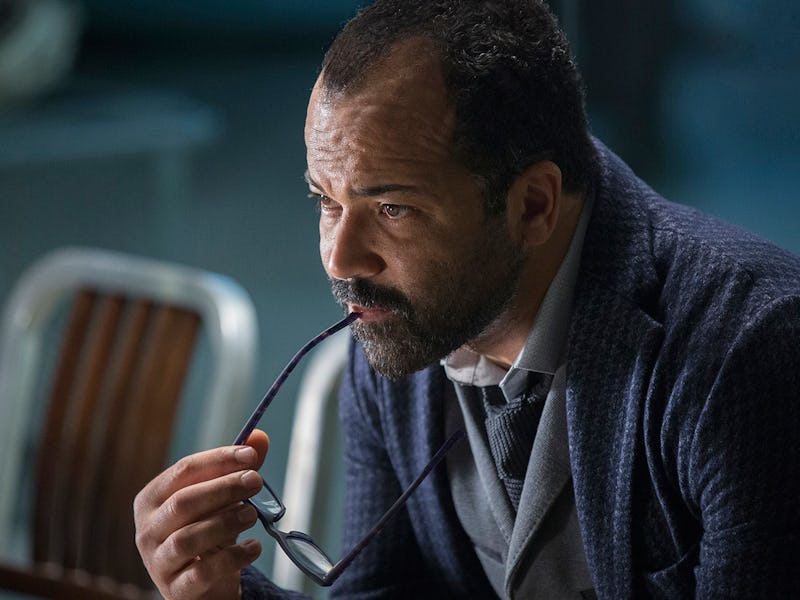Psychology Says You'd Be a Big Jerk in Westworld
Milgram's electric shocks and the Stanford Prison experiment suggest humans can't be trusted with power.

HBO’s Westworld works off the premise that humans are power-hungry monsters that, given the opportunity, will inflict just about as much pain on others as possible. Premise granted. Prestige television’s pessimism about human nature is built on a solid scientific foundation. Psychologists, economists, and sociologists have been able to experimentally demonstrate that humanity is twisted at its core.
The classic psychological example of low expectations left unmet is the Milgram experiment. Brief refresher from Psych 101: Stanley Milgram was a social psychologist at Yale in the 1960s and conducted an astoundingly simple experiment in which an unwitting volunteer was ordered by a man in a lab coat to deliver electric shocks — from “slight” shock to a deadly “severe shock” — when another person on the other side of a wall answered questions wrong. The volunteer would progressively increase the power of the shocks, and the man on the other side of the wall — who was in on the experiment — would scream in pain, asking for mercy and mentioning a heart condition. Many volunteers would hesitate, look to the man in the lab coat, and meekly wonder aloud if they shouldn’t stop, since the person on the other side was in pain. The supervisor in the lab coat, unshaken, asked them to go on. Most people, disturbingly, did.
It’s an experiment that has faced criticism for everything from its shady lack of ethics — today, an experiment that does not inform a volunteer of the true nature of an experiment and doesn’t offer any feedback would not fly — to being reflective of a different time and place. Milgram himself used the obedience studies as an explanation of why Nazi guards were so willing to inflict pain and torture on their fellow suffering humans.
Westworld seems to follow through with this thinking, with the addition of robots. We see a couple shoot some bandits gleefully then take a selfie with their corpses. We see humans think nothing of raping robots without consent, kill without a thought, and indulge in violence even though they come from a society that we can safely assume has taught them that such things are not just illegal, but morally wrong. Might Milgram have had an inkling of a Westworld-like world? It’s probably safe to say that at least Milgram’s humans were often conflicted about inflicting pain; the humans of the dystopian future seem positively savage in how much joy they derive from hurting others.
The scientists of 'Westworld' aren't much better than the humans running amok.
Perhaps the most shocking part of the show is that the scientists who hover over the Westworld universe see callous, atrocious behavior from humans and think nothing of it — but when an apparent glitch within robots starts making them rebel, all hell breaks loose.
Which brings to mind another disturbing psych example: the Stanford prison experiment, which attempted to understand how authoritarian behavior plays out in prisons. Just ten years after Milgram’s horrifying results, Philip Zimbardo created an alternate reality where some volunteers were assigned the role of prison guard and the rest were prisoners. Things went awry fast: Prison guards went to town on their subjects, who often passively accepted abuse; some used psychological tactics to try to turn prisoners against each other while others used the batons they were supplied with. After six days, Zimbardo called off the experiment, later citing distress at how society had broken down so fast, so horribly, so violently.
The fact that Westworld’s scientists — the baton carriers here — can so easily separate their emotions from observation and scientific discovery is both a good and bad thing. When the team of scientists rush onto the field after a murderous spree, it’s not the humans the scientists are worried about; no, the robot gone rogue is their utmost concern. Anthony Hopkins’s Dr. Robert Ford leads the team coolly, unwavering with humans, but deeply invested in a possible robot mutiny. If the Stanford Prison experiment and Milgram’s electric shocks say anything about Westworld, it’s this: Sure, we can think HBO is being gratuitous in its gory depictions of violence. But if anything, Westworld suggests that it’s not the robots we should be worried about; it’s the humans who so seamlessly, gleefully, violently slip into the role of monster.